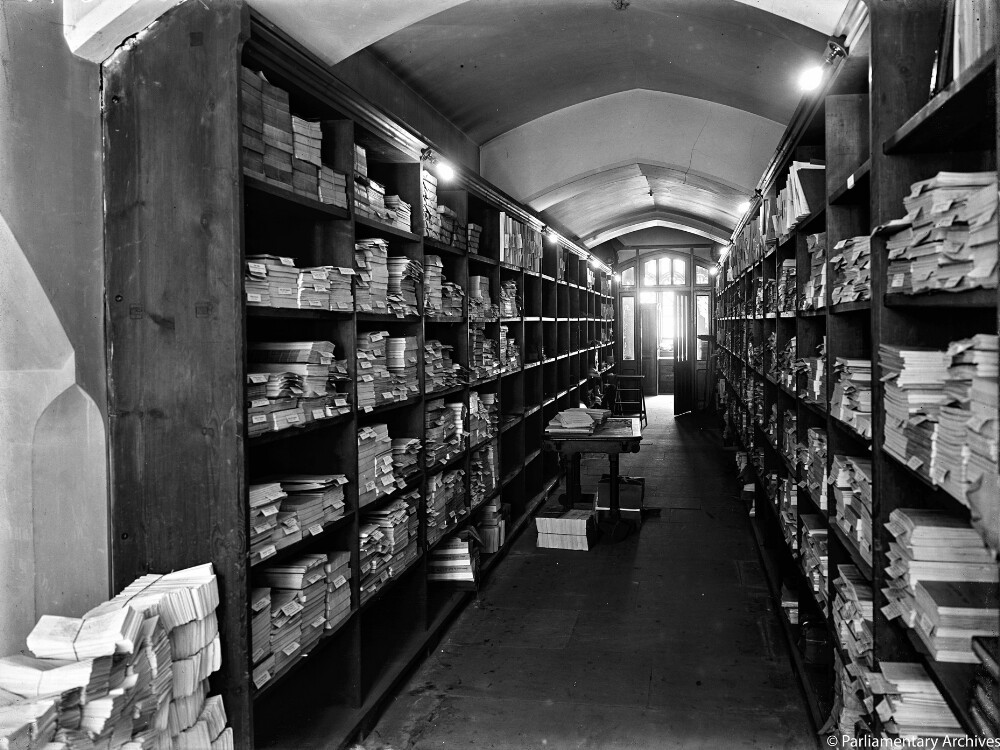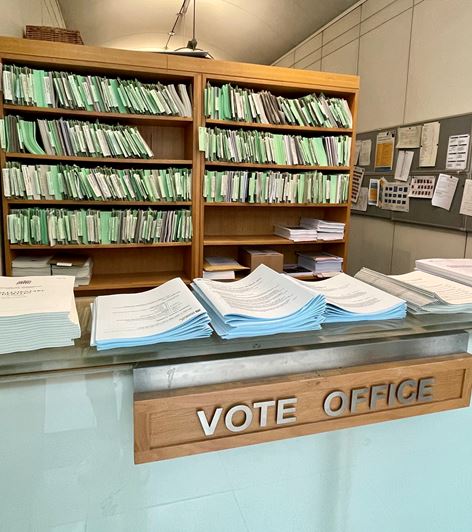Parliament's Vote Office is digitising, while sticking true to its roots
Members Lobby Vote Office (Credit: UK Parliament/Jessica Taylor)
6 min read
Allow The House to take you on a journey through Parliament… crossing the flagstone stretch of Westminster Hall and emerging into St. Stephen’s Hall, where stone parliamentarians watch down from on high. Popping up into Central Lobby, taking a twist and a turn downwards, past drinking hole, merchant and cash machine, to one of Parliament’s historic institutions: the Vote Office.
It is here that we meet Iliyan Nanchev, the Vote Office’s publications enquiries manager, in underground rooms lined, from floor to ceiling, with reams of paper. As we walk through each room, Nanchev points to the shelves: here, order papers and bills, there, Hansards and select committee reports, all filed meticulously in place.
The Vote Office’s story begins in 1682, when it began distributing one document to the parliamentary community: the votes and proceedings. Nanchev describes how the deliverer – the head of the Vote Office – would employ office members to carry the policy proceedings to Members of Parliament “on the stones”, referring to the six-mile radius across the estate.
“According to historical records, that was quite a lucrative enterprise back then,” he says. “That one document meant everything because it was, at the time, the only business paper and the only way to actually follow what was happening in the Chamber. I can understand why it was such a high-profile job.”
It was the Vote Office staff member at the time from the Members’ Lobby outlet who saw who the perpetrator was and pointed to him. He was then arrested
In the 20th century, as government functions expanded, the Vote Office started to publish a wider variety of documents. And while the Vote Office no longer relies on deliverers on bicycles to disperse documents, the demands of the role remain broadly similar today. “Our job is to be out there speaking to members on their way to the Chamber, and providing them with all of the business documents that they need to basically do their duty, both inside the Chamber but also outside – anything connected to their work as MPs,” says Nanchev. “We also have a lot of peers who come to us and ask us questions. It is always a pleasure to work with everyone.”
The Vote Office pivoted again in the 2000s to make use of evolving technology in modernising its service. Nanchev speaks animatedly of an app that has “proven to be quite popular” among Parliament’s community.
“The app contains the core business documents, the order paper, the Hansard – everything you need to navigate parliamentary business, but also what we call the ‘tags’, which is the relevant documentation to today’s debates,” he says. “[The app] also [provides] copies of oral statements and written ministerial statements, which is quite handy to have in one big digital form.” As well as the app, the Vote Office sends round a daily Topical Updates email, and is investigating increasing its presence on Parliament’s digital MemberHub.
 Vote Office in 1905 (Credit: Parliamentary Archives)
Vote Office in 1905 (Credit: Parliamentary Archives)
With such modernisations, is paper destined to go the same way as the cycling deliverers?
“Paper still has a role to play in Parliament,” Nanchev insists. “Just because obviously, there’s a lot of work which is very intense and fast paced. And sometimes it’s convenient to use paper for that purpose. For example, whenever a bill passes through its legislative stages through the House, there is a variety of different documents that have been produced at quite a fast pace. And in their course of work, MPs often resort to paper simply because whilst being in the Chamber, this can be quite a useful tool.”
While printing, processing and distributing Parliament’s paperwork makes for busy employment, Nanchev says Budget Day is particularly chaotic. “We only have about 60 minutes to ensure that we can prepare sets [of the Budget] for all members in the Chamber,” he says. “It is an incredibly fast-paced operation where copies from the main Vote Office are suddenly being ferried to Members’ Lobby, then the different packs are being put together with a few members behind the desk, whilst another colleague is communicating with members. It is a very well-oiled machine, so it runs very well. The level of adrenaline on Budget days, it’s incredible, especially since you see all of it play out in front of you on TV as well.”
However, Nanchev stresses that the Vote Office is “not just there to hand out papers”; they are also an advisory service. “Very often we have to field all sorts of interesting questions; quite challenging ones as well, about either a procedure, or about the order paper or about a certain motion.” Nanchev recalls questions about an act from the 1800s being particularly obscure, but says defiantly, “It is not impossible! It just needs to be printed if it is not on file.”
More recently, Nanchev’s “customers” – as he calls them – were asking questions about the Windsor Framework, probing into everything from the timings of its publication, down to the minutiae of its annexes. “We have to be very diplomatic and still very helpful,” he says – and most importantly, impartial. “Because we are a House service, we are not a party-political service, and it is important that we are equally as helpful to everyone without being seen as partisan.”
 Portcullis House Vote Office (Credit: Iliyan Nanchev)
Portcullis House Vote Office (Credit: Iliyan Nanchev)
While we are sitting in the main Vote Office, Nanchev paints a picture of its various satellite offices: the historic Parliament Street office, the sunny Portcullis House office – where he says the questions tend to be more niche – and, he says, the most dynamic one of them all, the Member’s Lobby outlet, where “everyone rushes to grab all of the papers they need before they head to the chamber”. “Each different office has its own little charm,” he adds proudly.
Being located so near to the epicentre of Parliament has given the Vote Office a story or two to tell over its long history. Take the Vote Office member of staff, who, in 1812, witnessed the assassination of prime minister Spencer Perceval in Members’ Lobby. “I think it is rumoured that when [Perceval] fell to the ground, his last words were, ‘Oh my god I have been murdered,’” Nanchev says, “but it was the Vote Office staff member at the time from the Members’ Lobby outlet who saw who the perpetrator was and pointed to him. He was then arrested. So that is quite an illustrious piece of history.”
Squirrelled away somewhere in the Vote Office is a coveted artefact – a book from the 1940s in which records of incoming government reports and administrative papers were kept. “Up until quite recently, before the pandemic, there was still an existing book, where we would record things,” Nanchev explains. “I just find it so fascinating to look at people’s handwriting, perhaps written when London was being bombed. I think that is incredible.”
For Nanchev, who has worked here for two years now, the fundamental role the Vote Office continues to play in Parliament is its main appeal. “There are so many paintings everywhere of the different deliverers and the historical Vote Office staff. And when you see that, and you see how old it is, you realise the continuity of it all,” he says. “It is really quite striking.”
